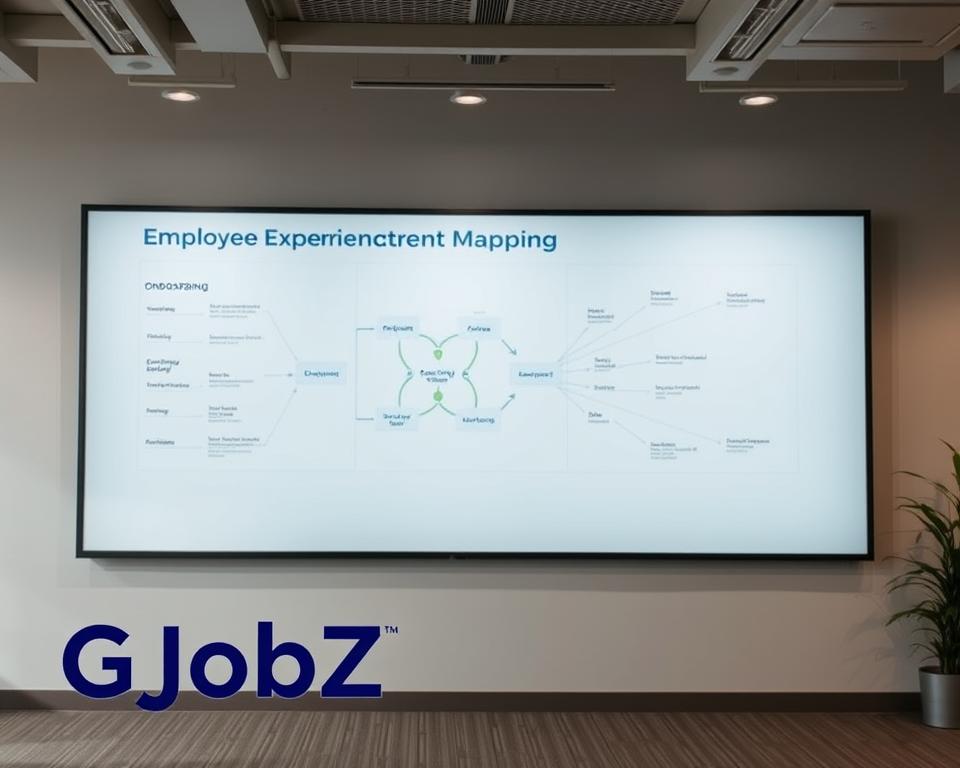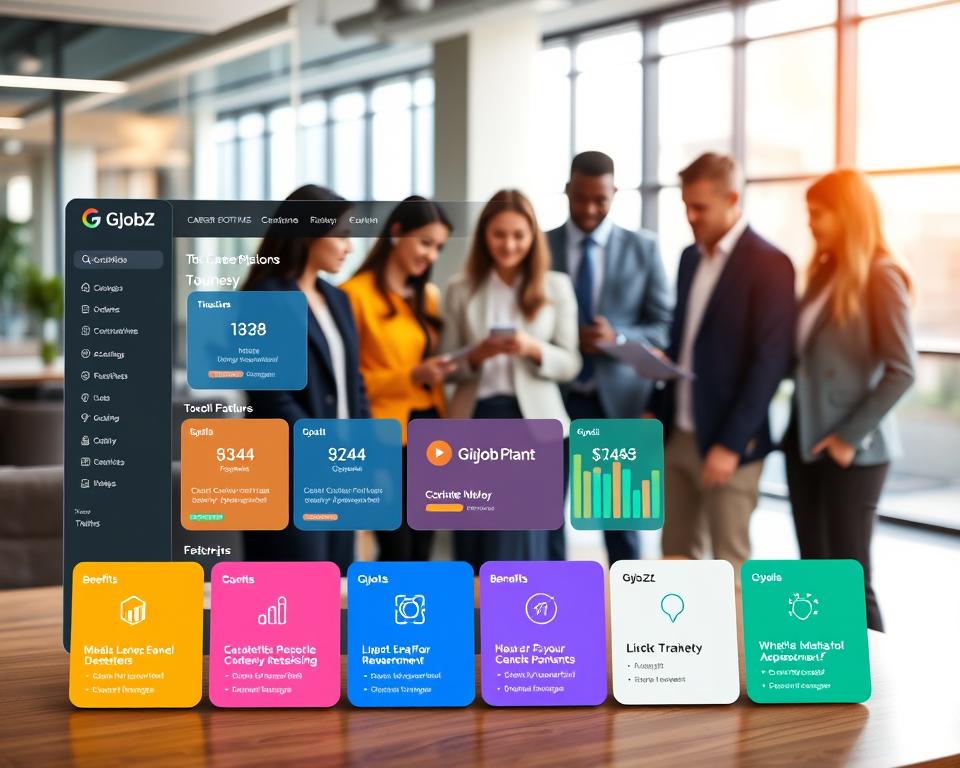
Best Platforms For Mapping Employee Promotions
Did you know that 76% of employees are more likely to stay with a company that offers clear career progression? In today’s workforce, transparency in career growth is no longer optional—it’s essential. Employees want to see a defined path forward, and organizations need tools to make this process seamless.
Data-driven tools like Delve AI, Pyn, and UXpressia are transforming how companies track and manage career advancements. These platforms not only help in identifying potential leaders but also ensure that every step of the employee journey is aligned with organizational goals. By integrating these tools, businesses can boost employee engagement and foster a positive company culture.
This article explores how these solutions enhance the employee experience and why they are critical for modern workplaces. From feature comparisons to implementation benefits, we’ll dive into what makes these tools indispensable for career growth strategies.
Key Takeaways
- Clear career progression boosts retention by 76%.
- Data-driven tools like Delve AI and Pyn streamline promotion tracking.
- Transparent career paths enhance employee engagement.
- Career mapping aligns with broader employee experience strategies.
- Modern tools foster a positive company culture.
Why Mapping Employee Promotions Matters
Clear career paths are no longer a luxury but a necessity for retaining talent. When organizations provide transparency in growth opportunities, they create a sense of trust and motivation among their workforce. This approach not only boosts morale but also aligns individual goals with organizational success.
The Role of Career Progression in Engagement
Career progression plays a pivotal role in keeping employees engaged. When individuals see a defined path forward, they are more likely to stay committed to their roles. Tools like the Predictive Index, which tracks emotional mapping on a -10 to +10 scale, highlight how transparency in promotions positively impacts sentiment.
For example, Salesforce’s implementation of structured promotion tracking reduced bias claims by 34%. This shows how documented career paths can enhance trust and fairness, leading to higher engagement levels.
How Tracking Promotions Enhances Company Culture
Transparent promotion processes foster a positive company culture. When employees feel that their growth is recognized and rewarded, it creates a sense of belonging. Glassdoor data reveals that organizations with clear progression plans see their culture scores rise by 2.1 stars.
Moreover, documented career paths improve cross-department mobility, allowing overall employee development. This approach also links directly to improvements in employee net promoter scores (eNPS), showcasing the broader impact of effective performance management.
Key Features to Look for in Employee Promotion Platforms
Choosing the right tools can make career growth transparent and efficient. Modern platforms offer advanced features that simplify tracking and planning career advancements. These tools ensure that every step aligns with the organization’s goals while enhancing the overall experience.

Real-Time Analytics and Reporting
Real-time analytics provide insights into career progression trends. Platforms like ChangeEngine offer dashboards that track promotions, identify gaps, and predict future needs. This data helps leaders make informed decisions and ensures fairness in the process.
For example, BambooHR’s API connectivity allows seamless data flow between systems. This ensures that performance reviews and promotion data are always up-to-date, reducing manual errors.
Customizable Career Path Templates
Customizable templates allow companies to design career paths that fit their unique structure. These templates can be tailored to roles, departments, or individual goals, ensuring flexibility and clarity.
Workday’s integration requirements highlight how templates can adapt to different workflows. This approach ensures that career paths are not only clear but also aligned with broader management strategies.
Integration with HR Systems
Seamless integration with HR systems is crucial for efficiency. Platforms that sync with tools like ADP payroll systems automate data updates, saving time and reducing errors.
Compliance reporting automation is another benefit of integration. This ensures that all promotion processes meet legal and organizational standards, reducing risks and enhancing trust.
| Feature | Benefit | Example |
|---|---|---|
| Real-Time Analytics | Provides actionable insights | ChangeEngine dashboards |
| Customizable Templates | Tailored career paths | Workday integration |
| HR System Integration | Automates data updates | ADP payroll sync |
Top Benefits of Using Employee Promotion Mapping Tools
Modern tools are reshaping how companies approach career development. These solutions provide a structured way to track and manage advancements, ensuring transparency and fairness. By leveraging these tools, organizations can create a more engaged and motivated workforce.

Improved Retention Rates
One of the most significant advantages is improved retention. When employees see a clear path for growth, they are more likely to stay with the company. Tools like Culture Amp offer engagement analytics, helping leaders identify areas for improvement and address concerns proactively.
Enhanced Performance Management
These tools also streamline performance management. By using data-driven insights, companies can optimize promotion budgets and ensure equitable progression. Features like DEI analytics and skills forecasting with AI algorithms make it easier to align individual goals with organizational objectives.
Data-Driven Decision Making
Finally, these platforms enable data-driven decision-making. Succession planning risk analysis and cost-per-promotion metrics provide actionable insights. This approach not only reduces bias but also ensures that every decision supports the overall business strategy.
- Promotion budget optimization models save resources.
- DEI analytics ensure fair and inclusive progression.
- AI-driven skills forecasting prepares for future needs.
- Succession planning minimizes risks.
- Cost-per-promotion metrics enhance financial planning.
How Employee Promotion Platforms Boost Engagement
Engagement in the workplace thrives when employees see a clear path to growth. Modern tools are designed to make this process transparent and motivating, ensuring that every team member feels valued and supported.

Transparent Career Growth Opportunities
Transparency in career growth is a game-changer. When employees understand the steps needed to advance, they are more likely to stay committed. Platforms like Leapsome create individualized development plans, ensuring that every team member knows what it takes to succeed.
These tools also provide real-time feedback and progress tracking. This keeps employees motivated and aligned with organizational goals, fostering a culture of trust and fairness.
Personalized Development Plans
Personalized plans cater to individual needs and aspirations. AI-powered skill recommendations help employees focus on areas that matter most. Microlearning module integrations make learning accessible and efficient.
- Certification tracking systems ensure that achievements are recognized.
- Cross-training opportunity alerts encourage skill diversification.
- The 70-20-10 development model balances formal learning, on-the-job training, and mentorship.
By offering personalized growth paths, these platforms not only boost engagement but also prepare employees for future challenges.
Best Platforms For Mapping Employee Promotions
Effective career growth strategies rely on tools that provide clarity and structure. Modern solutions like Delve AI, Pyn, and UXpressia are transforming how organizations approach career development. These platforms offer unique features that enhance the employee experience and provide actionable insights for continuous improvement.

Delve AI: Comprehensive Career Path Mapping
Delve AI stands out with its focus on persona-based journey segmentation. This feature allows companies to tailor career paths to individual roles and goals. Touchpoint performance scoring ensures that every interaction aligns with organizational objectives.
Additionally, Delve AI offers responsibility assignment matrices. These tools clarify roles and expectations, fostering accountability and transparency. Free template library access further simplifies the process, making it easier to implement structured career paths.
Pyn: Collaborative and Prioritized Strategy
Pyn emphasizes collaboration in career planning. Its platform enables teams to work together on defining and prioritizing growth opportunities. Experience gap heat maps identify areas for improvement, ensuring that no employee is left behind.
Pyn’s tools also integrate seamlessly with existing HR systems. This ensures that data flows smoothly, reducing manual errors and saving time. The result is a more efficient and effective approach to career development.
UXpressia: Identifying Gaps in Employee Experience
UXpressia excels at pinpointing gaps in the employee experience. Its advanced analytics provide deep insights into what’s working and what needs attention. This data-driven approach helps organizations make informed decisions.
Features like touchpoint performance scoring and responsibility assignment matrices ensure that every aspect of career growth is monitored. UXpressia’s tools are designed to enhance engagement and retention by addressing gaps proactively.
- Persona-based journey segmentation tailors paths to individual needs.
- Touchpoint performance scoring aligns interactions with goals.
- Responsibility assignment matrices clarify roles and expectations.
- Experience gap heat maps identify areas for improvement.
- Free template library access simplifies implementation.
How to Choose the Right Platform for Your Business
Selecting the right career growth platform can significantly impact your organization’s success. With so many options available, it’s essential to evaluate your needs and compare solutions to find the best fit. This ensures that your business can effectively manage career advancements while staying within budget.

Assessing Your Company’s Needs
Start by identifying what your organization requires from a career growth tool. Consider factors like team size, budget, and specific goals. For example, smaller teams might prioritize affordability, while larger organizations may focus on scalability.
Tools like TCO analysis templates and scalability requirement matrices can help you assess long-term costs and growth potential. This ensures that the platform you choose aligns with your business objectives.
Comparing Features and Pricing
Once you’ve identified your needs, compare the features and pricing of different platforms. Look for solutions that offer customizable templates, real-time analytics, and seamless HR system integration.
For instance, CultureMonkey starts at $3.50 per user, making it an affordable option for small teams. On the other hand, Leapsome offers advanced tools but requires contacting sales for pricing details. Use ROI calculation models and implementation cost comparisons to make an informed decision.
| Platform | Key Features | Pricing |
|---|---|---|
| CultureMonkey | Engagement analytics, feedback tools | $3.50/user |
| Leapsome | Personalized development plans, AI recommendations | Contact sales |
By carefully evaluating your needs and comparing options, you can choose a platform that enhances career growth while delivering value to your business.
Conclusion
Career growth tools are reshaping how businesses support their teams. When selecting the right solution, focus on features like real-time analytics, customizable templates, and seamless integration. These elements ensure a smooth employee experience and foster higher engagement.
Clear promotion paths directly impact profitability. Companies with transparent career progression see retention rates improve by up to 76%. As AI-driven tools evolve, they will further personalize career development, making it easier to align individual goals with organizational success.
Explore platforms like Delve AI, Pyn, and UXpressia to enhance your employee experience. Many offer free trials, allowing you to test their features and see the benefits firsthand. Investing in these tools not only boosts engagement but also ensures long-term growth for your team.